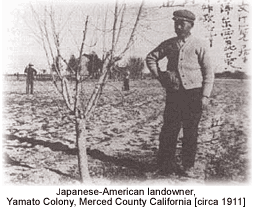The Japanese government was understandably troubled by the treatment given their emigrants living in the United States. Discriminatory activity was especially evident in California, where many Japanese had settled. Theodore Roosevelt had acted in 1908 to quell earlier tensions, but the racial situation had heated up again, early in Wilson’s first term.
 The roots of the anxiety in California were varied. Much opposition came from a white majority that was simply distrustful of people with different appearances, languages and customs. Others feared the impact of foreign laborers on a tight labor market. However, dislike of the Japanese was especially acute because of a strong work ethic that enabled many of them to succeed in their business ventures and accumulate large land holdings.
The latter characteristic became the object of a proposed law under consideration by the California legislature. Under this measure, restrictions were to be imposed upon the ability of aliens (unnaturalized foreigners living in the U.S.) to own land within the state. The Japanese government protested vehemently to Wilson, who dispatched Secretary of State William Jennings Bryan to California in a doomed effort to prevent the measure from becoming law. Tensions developed to such an extent that war rumors widely circulated.
In the end, the crisis dissipated, due in large part to Japanese recognition of Wilson’s sincere attempt to prevent the legislation from passing and also the understanding that a president could not dictate policy to state legislatures.
The land issue in California was one more in a growing list of issues that strained the relationship between the United States and Japan.
The roots of the anxiety in California were varied. Much opposition came from a white majority that was simply distrustful of people with different appearances, languages and customs. Others feared the impact of foreign laborers on a tight labor market. However, dislike of the Japanese was especially acute because of a strong work ethic that enabled many of them to succeed in their business ventures and accumulate large land holdings.
The latter characteristic became the object of a proposed law under consideration by the California legislature. Under this measure, restrictions were to be imposed upon the ability of aliens (unnaturalized foreigners living in the U.S.) to own land within the state. The Japanese government protested vehemently to Wilson, who dispatched Secretary of State William Jennings Bryan to California in a doomed effort to prevent the measure from becoming law. Tensions developed to such an extent that war rumors widely circulated.
In the end, the crisis dissipated, due in large part to Japanese recognition of Wilson’s sincere attempt to prevent the legislation from passing and also the understanding that a president could not dictate policy to state legislatures.
The land issue in California was one more in a growing list of issues that strained the relationship between the United States and Japan.